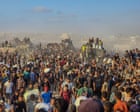
The complex situation in Gaza has escalated with new developments surrounding the humanitarian aid system designed to provide much-needed relief to Palestinians. While initially intended to offer vital sustenance to those in need, recent reports and incidents have raised significant concerns over the implementation and impact of this initiative.
At the heart of the issue is a collaborative aid distribution scheme overseen by Israel and the United States. Designed to alleviate severe resource scarcities, the system has, according to United Nations Secretary-General António Guterres, resulted in fatalities among those simply striving to secure food for themselves and their families. Médecins Sans Frontières (MSF) has characterized the initiative as a form of “slaughter masquerading as humanitarian aid,” urging a reevaluation of its operations.
The situation has intensified due to allegations of excessive force at aid distribution points. Palestinian witnesses and health officials have reported instances of Israeli forces opening fire on civilians converging at these sites. These distressing reports indicate a mounting toll, with hundreds killed and thousands injured in recent weeks while attempting to access essential supplies. The urgent nature of these circumstances has led to increased scrutiny from various international bodies.
In response to the growing evidence and gravity of the situation, the Israel Defense Forces (IDF) have initiated an inquiry into possible war crimes connected to these tragic events. The investigation aims to shed light on the circumstances that have led to such dire outcomes, probing allegations of deliberate targeting of civilians. This step marks an acknowledgment of international concern and a potential move towards accountability.
Adding to the complexity are specific incidents that have emerged, including an Israeli strike on Palestinian police officers distributing flour in the city of Deir al-Balah, resulting in the deaths of 18 individuals. This attack is one of several that have intensified fears among the population and underscored the precariousness of the situation in the region. The ongoing conflict and struggle for resources have unfortunately placed innocent lives at risk, exacerbating an already challenging humanitarian crisis.
While this inquiry and subsequent actions aim to uncover the truth and possibly recalibrate measures to ensure civilian safety, the situation’s underlying tension highlights the urgent need for a comprehensive resolution. As the world watches, humanitarian organizations and international actors alike emphasize the importance of swift, peaceful interventions to alleviate suffering and foster an environment where aid can reach those who need it most without fear or danger.
The ongoing investigation and dialogue signal a potential pathway towards improving conditions and ensuring that aid efforts genuinely serve their protective and life-sustaining purpose. The call for change, rooted in a compassionate understanding of the challenging realities faced by civilians, resonates globally as stakeholders work towards a hopeful and humane resolution to the distressing circumstances in Gaza.
Source: {link}
